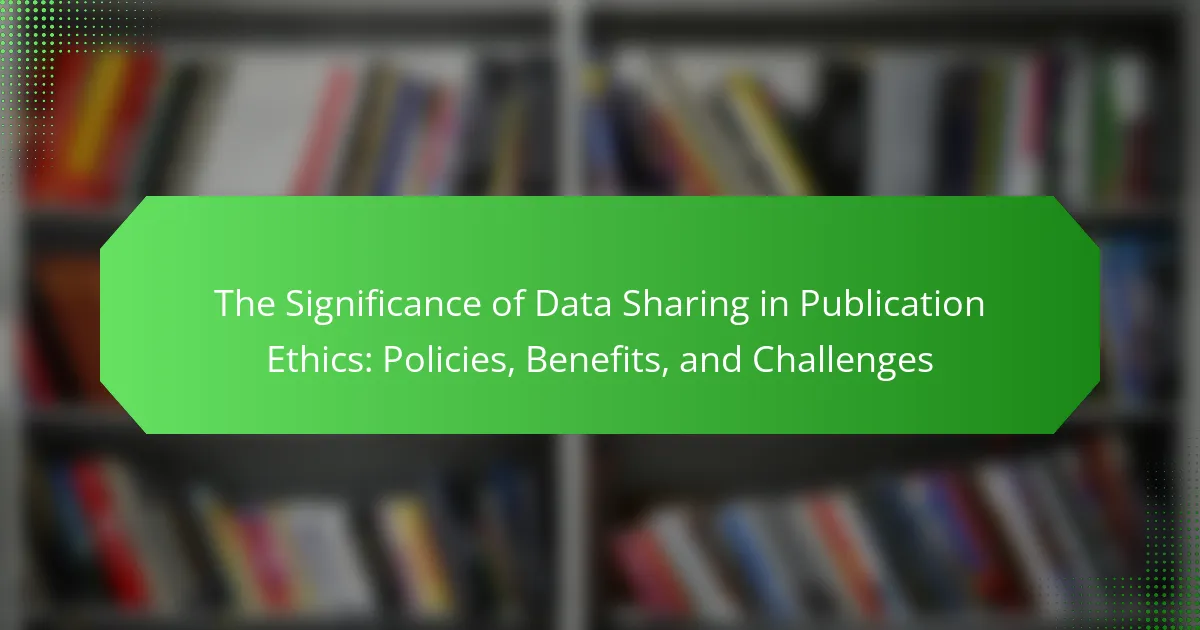Data sharing is a critical component of publication ethics, promoting transparency, accountability, and credibility in research. This practice allows for the verification of results, helps prevent issues such as data fabrication and plagiarism, and fosters collaboration among researchers, ultimately enhancing scientific discovery and innovation. However, challenges such as data misuse, intellectual property concerns, participant confidentiality, and a lack of standardization in data formats hinder effective data sharing. Future trends indicate a shift towards increased transparency, enhanced collaboration, and stricter compliance measures, supported by technological advancements like blockchain for data integrity. Overall, the article explores the significance of data sharing in publication ethics, highlighting its benefits, challenges, and the evolving landscape of research practices.

What is the significance of data sharing in publication ethics?
Data sharing is crucial in publication ethics as it promotes transparency and accountability. It allows for the verification of results by other researchers. This practice enhances the credibility of published research. Increased transparency can help prevent issues like data fabrication and plagiarism. Furthermore, data sharing facilitates collaboration among researchers, leading to more robust findings. Studies show that open data can accelerate scientific discovery and innovation. For instance, a report by the National Academies of Sciences emphasizes that data sharing can significantly improve reproducibility in research. Overall, data sharing is a fundamental aspect of ethical research practices.
Why is data sharing important in the context of publication ethics?
Data sharing is important in the context of publication ethics because it promotes transparency and accountability in research. Transparency allows for verification of results, which is essential for scientific integrity. When researchers share their data, it enables others to replicate studies and validate findings. This practice helps to prevent misconduct and enhances the credibility of published work. Additionally, data sharing fosters collaboration among researchers, leading to more robust scientific advancements. According to a study published in the journal “Nature,” transparency in data sharing can significantly reduce instances of research fraud.
What ethical principles support data sharing in research publications?
Ethical principles supporting data sharing in research publications include transparency, accountability, and collaboration. Transparency ensures that research findings are accessible and verifiable by others. This principle promotes trust in the scientific process. Accountability holds researchers responsible for their data and findings. It encourages integrity in reporting results. Collaboration fosters a community-oriented approach to research. It allows for the pooling of resources and knowledge. These principles align with the broader ethical standards in research, such as those outlined by the Committee on Publication Ethics (COPE). COPE emphasizes the importance of sharing data to enhance reproducibility and scientific advancement.
How does data sharing enhance transparency and accountability?
Data sharing enhances transparency and accountability by making information accessible to all stakeholders. When data is shared openly, it allows for independent verification of findings. This process helps to build trust among researchers, institutions, and the public. Transparency in data sharing reduces the likelihood of misconduct and promotes ethical practices. For instance, studies show that open data policies lead to more reproducible research outcomes. According to the Nature journal, research articles that share data are cited more frequently, indicating a positive impact on academic integrity. Furthermore, data sharing fosters collaboration and innovation by enabling others to build upon existing work. Overall, data sharing is a critical component in promoting a culture of accountability within research.
What are the key policies governing data sharing in publication ethics?
Key policies governing data sharing in publication ethics include transparency, consent, and reproducibility. Transparency requires authors to disclose data availability and sharing practices. Consent involves obtaining permission from participants before sharing their data. Reproducibility emphasizes the need for data sharing to allow others to verify findings. These policies aim to enhance research integrity and foster collaboration. The Committee on Publication Ethics (COPE) provides guidelines supporting these principles. Journals often require data sharing statements to uphold these ethical standards.
Which organizations establish data sharing policies for researchers?
Several organizations establish data sharing policies for researchers. Prominent examples include the National Institutes of Health (NIH) and the National Science Foundation (NSF). The NIH has specific guidelines for sharing data generated from funded research. The NSF also mandates data management plans for grant proposals. Additionally, the International Committee of Medical Journal Editors (ICMJE) encourages data sharing in biomedical research. These organizations aim to enhance transparency and reproducibility in research. Their policies often require researchers to make data publicly accessible. This promotes collaboration and advances scientific knowledge.
How do institutional policies influence data sharing practices?
Institutional policies significantly shape data sharing practices by establishing guidelines and frameworks for how data can be accessed and utilized. These policies dictate the level of openness and transparency required for sharing research data. For example, institutions may mandate that researchers deposit data in public repositories to enhance accessibility. This encourages compliance with ethical standards in research and publication. Moreover, institutional policies often outline the consequences for non-compliance, which can deter researchers from withholding data. Evidence from a study by the National Institutes of Health indicates that clear institutional policies lead to increased data sharing among researchers. Such policies not only promote collaboration but also enhance the reproducibility of research findings.
What benefits does data sharing provide in publication ethics?
Data sharing enhances transparency in publication ethics. It allows for the verification of research findings by independent parties. This verification process increases trust in published results. Furthermore, data sharing promotes reproducibility of research, a cornerstone of scientific integrity. Studies show that reproducible research leads to more robust findings. It also encourages collaboration among researchers, fostering innovation and knowledge exchange. Data sharing can reduce the risk of misconduct by providing a clear audit trail. Lastly, it supports compliance with funding agency requirements, which often mandate data sharing.
How does data sharing improve the quality of research findings?
Data sharing improves the quality of research findings by enhancing transparency and reproducibility. When researchers share their data, it allows others to verify results and methodologies. This verification process helps identify errors or biases that may have gone unnoticed. A study by the National Academy of Sciences found that sharing data leads to more robust conclusions. Additionally, data sharing fosters collaboration among researchers, leading to diverse perspectives. This collaboration can result in innovative approaches and solutions. Overall, data sharing contributes to a more trustworthy and credible research environment.
What role does data sharing play in fostering collaboration among researchers?
Data sharing plays a crucial role in fostering collaboration among researchers. It enables the pooling of resources and expertise. When researchers share data, they can build upon each other’s work. This accelerates the pace of discovery and innovation. Collaborative studies often yield more comprehensive results. For instance, the Human Genome Project exemplified successful data sharing. It involved thousands of researchers across various institutions. They collectively advanced the understanding of genetics. Shared data also enhances transparency and reproducibility. This builds trust within the scientific community. Overall, data sharing is essential for effective collaboration among researchers.

What challenges are associated with data sharing in publication ethics?
Data sharing in publication ethics faces several challenges. One major challenge is the risk of data misuse or misinterpretation. Researchers may fear that their data could be taken out of context. Intellectual property concerns also arise, as sharing data may expose proprietary information. Additionally, there are ethical concerns regarding participant confidentiality and data privacy. Researchers must ensure that shared data does not compromise the identities of study participants. The lack of standardization in data formats further complicates sharing efforts. Different disciplines may use varying methods for data collection and presentation. Finally, there is often a lack of incentives for researchers to share data. Many funding agencies and institutions do not prioritize or reward data sharing practices.
What are the common barriers to effective data sharing?
Common barriers to effective data sharing include lack of standardization, privacy concerns, and resource limitations. Lack of standardization means that different organizations may use varying formats or terminologies. This inconsistency complicates data integration and interpretation. Privacy concerns arise when sensitive information is involved. Researchers often hesitate to share data that could identify individuals. Resource limitations refer to inadequate funding or infrastructure for data sharing initiatives. Many institutions lack the necessary technology or personnel to facilitate effective data sharing. Additionally, cultural resistance within organizations can hinder collaboration. Researchers may prioritize individual projects over collective data sharing efforts. These barriers collectively impede the potential benefits of data sharing in research.
How do privacy concerns affect data sharing practices?
Privacy concerns significantly limit data sharing practices. Organizations often prioritize safeguarding personal information to comply with regulations. For example, the General Data Protection Regulation (GDPR) imposes strict rules on data handling. This leads to reduced willingness to share data openly. Researchers may face ethical dilemmas when balancing transparency and privacy. Consequently, some may opt for anonymization techniques to protect identities. Such practices can hinder the richness of shared data. Ultimately, privacy concerns shape policies that govern data sharing protocols.
What technical challenges arise in the data sharing process?
Technical challenges in the data sharing process include data privacy concerns, interoperability issues, and data quality assurance. Data privacy concerns arise when sensitive information is shared, risking breaches of confidentiality. Interoperability issues occur when different systems or formats prevent seamless data exchange. Data quality assurance is critical, as inconsistencies or inaccuracies can lead to flawed analyses. These challenges can hinder effective collaboration and limit the potential benefits of data sharing.
How do researchers navigate the complexities of data sharing?
Researchers navigate the complexities of data sharing by adhering to established guidelines and ethical standards. They often follow institutional policies that outline data management practices. Researchers also utilize data sharing platforms that ensure compliance with legal and ethical requirements. Collaboration with co-authors and stakeholders helps clarify responsibilities regarding data use. They prioritize transparency to foster trust among peers and the public. Researchers may anonymize sensitive data to protect participant confidentiality. Additionally, they engage in training on data sharing best practices. These strategies collectively enhance the integrity and accessibility of shared research data.
What strategies can researchers employ to overcome data sharing challenges?
Researchers can employ several strategies to overcome data sharing challenges. First, establishing clear data sharing agreements is essential. These agreements outline the terms and conditions for data access and use. Second, utilizing standardized data formats enhances compatibility and ease of sharing. Third, implementing robust data management plans ensures organized data handling throughout the research process. Fourth, engaging with institutional repositories can facilitate secure data storage and sharing. Fifth, fostering collaborations with other researchers encourages shared resources and knowledge. Lastly, providing training on data sharing practices can increase awareness and compliance among researchers. These strategies collectively address common obstacles and promote effective data sharing.
How can collaboration with data repositories facilitate data sharing?
Collaboration with data repositories facilitates data sharing by providing centralized access to diverse datasets. This centralized access enhances interoperability among researchers. It allows for standardized data formats and protocols, making data exchange easier. Collaborative platforms often include tools for data management and sharing permissions. These tools ensure that data is shared ethically and in compliance with publication standards. Research shows that data sharing can increase the visibility and impact of published work. A study by Piwowar et al. (2011) found that openly shared data leads to more citations. Therefore, collaboration with data repositories not only streamlines access but also promotes ethical sharing practices.

What are the future trends in data sharing and publication ethics?
Future trends in data sharing and publication ethics include increased transparency, enhanced collaboration, and stricter compliance measures. Transparency will be prioritized through open access and data availability. Enhanced collaboration among researchers will lead to shared datasets and collective studies. Stricter compliance measures will ensure adherence to ethical guidelines and data protection laws.
Additionally, the integration of technology will facilitate better data management. For instance, blockchain may be used to ensure data integrity and traceability. Researchers will also adopt standardized protocols for data sharing to enhance reproducibility. According to a 2021 study by Tenopir et al., 70% of researchers support open data sharing practices. This indicates a significant shift towards ethical data sharing in academia.
How is technology shaping the landscape of data sharing?
Technology is transforming data sharing by enhancing accessibility, security, and efficiency. Cloud computing allows users to store and share data remotely. This technology enables real-time collaboration among researchers and organizations. Blockchain technology provides secure, transparent data sharing by ensuring data integrity. Application Programming Interfaces (APIs) facilitate seamless integration between different systems. The rise of open data initiatives promotes transparency and public access to research data. According to a 2020 report from the European Commission, 90% of researchers believe that data sharing accelerates scientific discovery. These technological advancements are reshaping how data is shared across various sectors.
What innovations are emerging to support ethical data sharing?
Innovations emerging to support ethical data sharing include blockchain technology and federated learning. Blockchain ensures data integrity and transparency by providing a decentralized ledger for transactions. This technology allows researchers to track data usage and access while maintaining privacy. Federated learning enables machine learning models to be trained on decentralized data without transferring sensitive information. This method safeguards user privacy and complies with data protection regulations. Additionally, data-sharing platforms are implementing standardized protocols to facilitate secure exchanges. These innovations collectively enhance trust and compliance in data sharing practices.
What best practices should researchers follow for ethical data sharing?
Researchers should follow several best practices for ethical data sharing. First, they must obtain informed consent from participants before sharing any data. This ensures that individuals understand how their data will be used. Second, researchers should anonymize data to protect participant identities. Anonymization reduces the risk of re-identification. Third, they should comply with relevant legal and institutional guidelines. Adhering to these regulations promotes responsible data management. Fourth, researchers should share data in a secure manner. Utilizing secure platforms helps to prevent unauthorized access. Fifth, they should provide clear documentation with shared data. Documentation enhances transparency and facilitates proper use of the data. Lastly, researchers should consider the potential impact of data sharing on participants. Understanding these implications fosters ethical considerations in the research process. Following these practices supports integrity in research and promotes trust in the scientific community.
How can researchers ensure compliance with data sharing policies?
Researchers can ensure compliance with data sharing policies by understanding the specific requirements outlined in those policies. They should review institutional, funder, and journal guidelines carefully. Creating a data management plan can help outline how data will be shared. Researchers must also obtain necessary permissions for sharing sensitive data. Regular training on data sharing and ethical practices is essential. Engaging with data repositories that meet policy standards is advisable. Documenting compliance efforts can provide proof of adherence to policies. Regular audits of data sharing practices can further ensure ongoing compliance.
What resources are available to assist researchers in data sharing?
Researchers can access several resources to assist with data sharing. These include data repositories, which provide secure storage and sharing options. Examples of such repositories are Dryad, Figshare, and Zenodo. These platforms allow researchers to upload datasets and share them with others. Additionally, many academic journals have specific data sharing policies that guide authors in making their data publicly available. Tools like GitHub also facilitate collaborative data sharing and version control. Furthermore, institutions often provide guidelines and support services for data management and sharing. Resources like the Data Management Planning Tool (DMPTool) help researchers create data management plans. These resources collectively enhance the accessibility and transparency of research data.
The main entity of the article is data sharing in the context of publication ethics. The article outlines the significance of data sharing as a means to enhance transparency, accountability, and collaboration in research, while also addressing the ethical principles that support these practices. It discusses the key policies governing data sharing, the benefits it provides, and the challenges researchers face, including privacy concerns and technical barriers. Additionally, the article highlights future trends and innovations that are shaping ethical data sharing, along with best practices and resources available to assist researchers in navigating this complex landscape.


